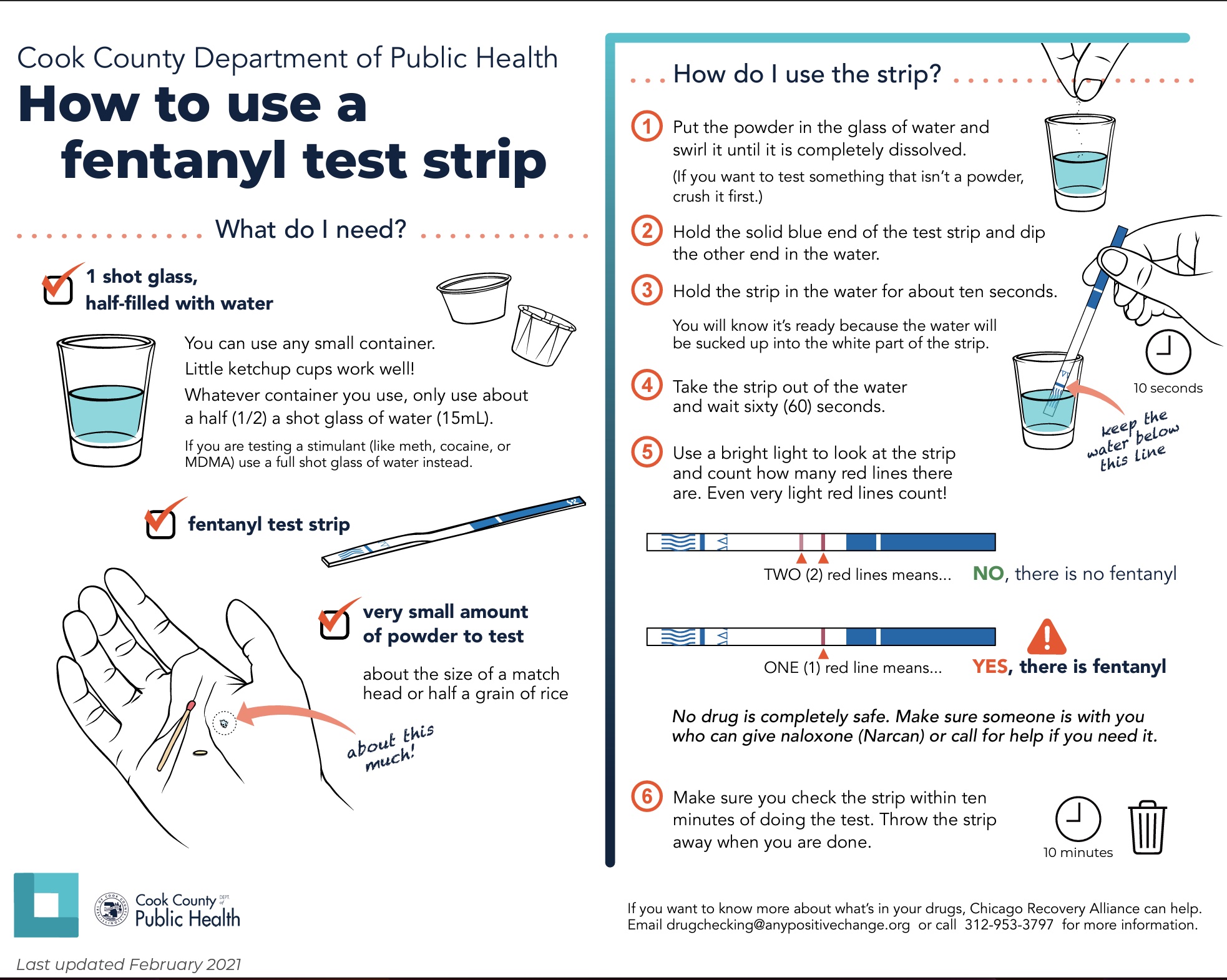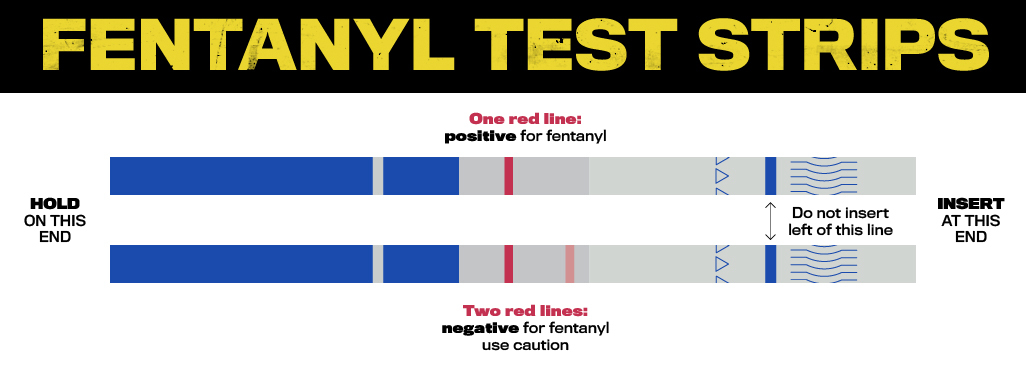Fentanyl Overdose Prevention
Fentanyl Overview
What is Fentanyl?
Fentanyl is a potent synthetic opioid medication that is used medically for the management of severe pain under the close supervision of a health care provider. Fentanyl is up to 50 times stronger than heroin and 100 times stronger than morphine, so even a small amount can lead to an overdose. It is impossible to know whether any drug has been laced with fentanyl just by looking at it, and fentanyl has no distinct taste.Understanding Overdoses
Opioid overdoses occur when the body experiences an excessive amount of opioids, leading to life-threatening symptoms, including slowed breathing, loss of consciousness, and death. These situations can arise from the misuse of prescription pain medications or illicit drugs like heroin and fentanyl, as well as the ingestion of substances unknowingly laced with an opioid like fentanyl. Substances that could be laced with fentanyl include counterfeit prescription medications, cannabis/marijuana, and other illicit drugs, such as heroin, molly/ecstasy, and cocaine.
Strategies to Reduce Risk of Fentanyl Overdose
The only safe and risk-free option is to only use medications prescribed to you, dispensed directly to you by a pharmacist, and used exactly as prescribed. If you choose to use a non-prescription illicit drug or a prescription drug that is not prescribed to you, there is no way to guarantee the drug is not laced with fentanyl or other potentially harmful substances. However, there are ways to reduce risk of serious injury or death from an opioid overdose, including testing your drugs for fentanyl and carrying and administering Narcan (naloxone) if you see someone who may be experiencing an opioid overdose.
Fentanyl Test Strips
Fentanyl test strips are small, portable tools that allow users to test substances/drugs for the presence of fentanyl and some fentanyl analogs.
How to use Fentanyl Test Strips

Common Questions about Fentanyl Test Strips
What drugs should I test for the presence of fentanyl? The drugs/substances below could be laced with fentanyl and should always be tested before use, but this is not an exhaustive list.
- Illicit drugs like heroin, cocaine, and methamphetamine (meth)
- Party drugs like molly/ecstasy
- Any prescription medications that have not been prescribed to you and dispensed directly to you by a pharmacist. Illegally made fentanyl can be made into counterfeit pills that resemble other prescription medications.
How do I read a test?

Image: Centers for Disease Control and Prevention
One red line = positive for fentanyl
Two red lines = negative for fentanyl
Remember: This is the opposite of typical COVID-19 tests!
What if I get a positive test? Discard the substance immediately. Because of the potency of fentanyl, even a small amount can be deadly.
What if I get a negative test? Fentanyl test strips are not foolproof and may not detect all forms of fentanyl or other dangerous substances. A negative test result does NOT guarantee that the drug does not have fentanyl or other dangerous substances, so test strips should always be used in conjunction with other harm reduction practices, even if the test is negative.
What are the limitations of fentanyl test strips?
- Test strips may not detect all forms of fentanyl or other dangerous substances. Although the test strips do detect a majority of fentanyl analogs, they do not detect 100% of them. They also do not detect other substances, such as xylazine (street name Tranq), which has been found in the drug supply and can be just as dangerous as fentanyl.
- The test may show false negative if it is not used correctly, so be sure to follow the directions.
- Test strips do not indicate the amount or potency of fentanyl present.
- Even if present, fentanyl is not always evenly distributed throughout the drug. If you do not test all the drug, you may get a false negative result from the portion you tested, even though fentanyl is still present in other portions. Depending on the type of drug and how it Is used, it may not be feasible to test all of the drug.
Remember: A negative test result does NOT guarantee that the drug is safe from harm.
Where can I get fentanyl test strips?
FREE fentanyl test strips are available in the following locations on campus:
- Norris Center Desk
- The SOURCE (Norris third floor)
- Center for Student Advocacy and Wellness (CSAW) (third floor of Searle Hall, 633 Emerson St.)
- Area Desks (Allison, Sargent, Schapiro, and Willard)
You do not have to speak with a staff member to pick up test strips and no information will be collected from you.
Naloxone (brand name Narcan)
What is Naloxone?
Naloxone is a medication that can rapidly reverse the effects of an opioid overdose. It works by binding to the same receptors in the brain as opioids, effectively blocking their effects and restoring normal breathing. Naloxone is not effective against other forms of overdose.
Although Naloxone is a lifesaving tool, it has limitations. It may not fully reverse the effects of potent opioids like fentanyl, and multiple doses may be required. Naloxone is not a substitute for emergency medical care, so it is crucial to call 911 immediately when an overdose is suspected, regardless of whether naloxone is used.
How Can I Get Naloxone (Narcan)?
The simplest form of naloxone, the nasal spray, is available by prescription, as well as over the counter at pharmacies and on-campus through the Center for Student Advocacy and Wellness (CSAW). If you or someone you know uses illicit drugs or prescription medications that are not prescribed for them, you should consider carrying naloxone. Students can obtain naloxone from CSAW by attending a one-hour training on how to recognize and respond to opioid overdoses and how to appropriately administer naloxone.
Register for an existing training or express interest in attending a future training using this Google form.
Other Harm Reduction Strategies
If you choose to use drugs, in addition to using fentanyl test strips and carrying naloxone, you should:
- Use in a safe space with people you trust and never use alone.
- Have a plan to seek help if you or someone you know experiences an emergency. Know how to recognize the signs and symptoms of an overdose and how to help. If at any time there is concern that somebody is suffering from an overdose, call for help so that you are covered under the Amnesty through Responsible Action policy.
- Avoid mixing drugs/substances, including alcohol. They can have unintended interactions with each other that increase the risk of an overdose. This is especially important if you are using a drug/substance for the first time and do not know how it affects you.
Additional Resources
- NU Alcohol and Other Drug Resources
- Chicago Recovery Alliance
- National Helpline for Substance Abuse and Mental Health Services Administration (SAMHSA): 1-800-662-HELP (4357)
- National Institute on Drug Abuse (NIDA)